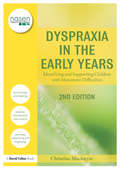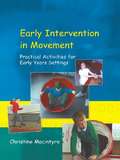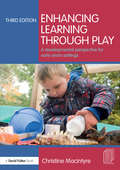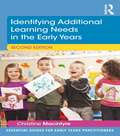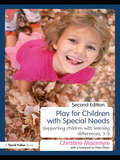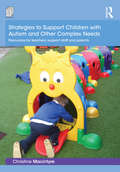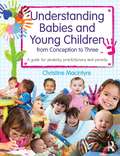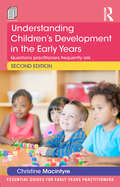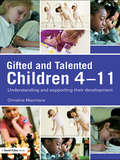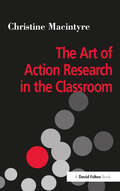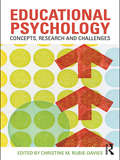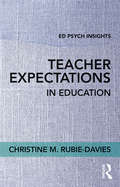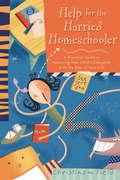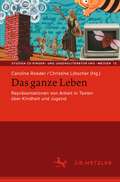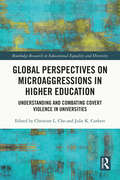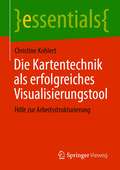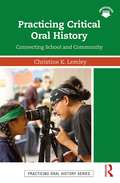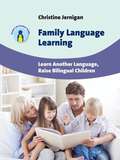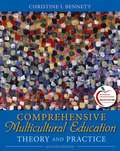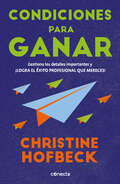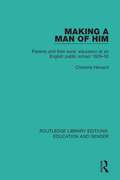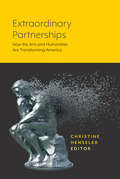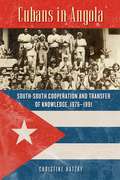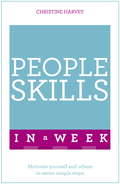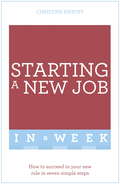- Table View
- List View
Dyspraxia in the Early Years: Identifying and Supporting Children with Movement Difficulties (nasen spotlight)
by Christine MacintyreToday there are more children than ever before in need of a variety of additional support needs, and many of these children have poor movement as a key contributory factor. Even in children with no specific ‘label’, movement is being found to be linked to learning, and educational professionals need to understand what is amiss and how to support children who do not meet their motor milestones at the correct time. The brand new topic areas featured in this comprehensive and practical new edition include: a discussion of terminology and labelling (in light of current inclusion guidelines) a range of age specific activities a section on the neurology of dyspraxia, showing the motor pathways that are energised and define motor competence a greater emphasis on balance, coordination and control examples from children of how movement is dependent on planning, sequencing and organising more practical activities that can form the basis of a programme to support the children. Practical strategies are provided throughout this authoritative book, so that teachers and other professionals can identify and understand movement difficulties, are empowered to support the children, and work effectively with the parents.
Early Intervention in Movement: Practical Activities for Early Years Settings
by Christine MacintyreThis text is full of practical ideas to help all early years children enjoy developing their movement abilities. Each activity uses rhymes and jingles and some have music. This is to enhance the children's rhythmic ability, their listening skills and their phonological awareness. There are many activities that form the basis of lesson plans. The material shows how the learning outcomes fulfil the criteria set out in the Curriculum Guidance for the Foundation Stage and the 5-14 Guidelines (Expressive Arts). The activities will be great fun for all children, whether they find movement easy and are always on the look-out for challenges, or whether they are less confident. The book aims to support teachers in their work to help all children fulfill their potential, offering guidance on diagnosis and assessment of skills and weaknesses as well as observation and progression. Chapters include developing the basic movement patterns: gross movements, fine movements and manipulative skills; developing sensory integration; teaching and observing movement; and detailed lesson plans. All children, whatever their level of ability, can be helped to be more confident and competent movers - a process which often also results in improved self-esteem. Teachers and support staff in all early years settings will find much in this book to inspire and enthuse all children in their care.
Enhancing Learning through Play: A developmental perspective for early years settings
by Christine MacintyreWritten to explain why children need to play and offering practical guidance on how to best support children’s development through play, this fully updated third edition includes a wealth of new information to reflect recent changes in the curriculum and early years qualifications. Featuring new chapters on pretend play and the impact of parenting on child development, the book addresses practitioners key concerns through an accessible Q&A format supported with case studies relating to different play situations. It encourages the reader to challenge their own perceptions about play, exploring why children behave as they do at different stages in their development and showing how play can complement and enhance their social, emotional, perceptual motor and intellectual development. This jargon free, updated edition presents: a clear and detailed explanation of the different kinds of play children engage in as they learn and grow. how children learn through their play in a variety of situations. the subtle but genuine differences between male and female development. the difficulties children may have when they have over or under sensitivity to any specific sense or any problems with movement. the importance of emotional well being in children and how this affects their ability to play. an introduction to senses and brain development. Providing a grounded and gentle introduction to child development, this book brings a deeper understanding of children’s learning through play and is an invaluable resource for students on early years courses and practitioners.
Identifying Additional Learning Needs in the Early Years: Listening To The Children (Essential Guides for Early Years Practitioners)
by Christine MacintyreI know there is something wrong, but what? How do I know if outside help for this child is needed? How do I tell parents that their child could have a learning difficulty? These are questions that most nursery workers will have to face during their careers, and questions which this new edition of Identifying Additional Learning Needs sets out to answer. Based on the experiences of real children and typical situations in early years settings, this book will be an invaluable companion for early years practitioners who care for and educate young children with additional learning needs. Attention Deficit Disorder, dyspraxia, dyslexia and autism are some of the difficulties explained in depth, with detailed suggestions to help support children with these special needs. Chapters in this fully revised new edition: explore the process of early identification; show how to make inclusion a reality in the nursery; tackle the complex issue of dealing with parents; discuss techniques for skilled and informed observation and assessment. Include developmental charts to allow a child’s progress to be monitored and celebrated. Each chapter has an explanation section supported by a set of practical strategies to support both the child and the practitioner. Throughout this lively and informative book, Christine Macintyre uses case studies to highlight the importance of listening to young children and shows how making time for listening is vital to providing exactly the right level of help and support.
Play for Children with Special Needs: Supporting children with learning differences, 3-9
by Christine MacintyreThere are many more children with learning differences and difficulties in our schools today. Their needs are varied and complex and professionals must find appropriate ways to enhance their learning. The value of play is endorsed in policy initiatives including The Early Years Foundation Stage curriculum, so professionals can be reassured that ‘more time to play’ is in line with the latest thinking. Christine Macintyre emphasises the importance of creating an environment where children become confident, independent learners, increasingly able to use their imaginations, care for others and to take safe risks. This fully revised edition of Play for Children with Special Needs includes new research findings and explains their implications for practice. This book then enables those supporting children to: understand the benefits of play and how to adapt different scenarios to support children who do not find it easy to play observe children as they play so that any difficulties can be identified early analyse different play areas so that the different kinds of learning (intellectual, creative, motor, social and emotional) are appreciated. Play for Children with Special Needs, 2nd edition enables practitioners to appreciate the contribution that play makes to the education of all children, whether they have special needs or not. It is for parents, teachers, teaching assistants and nursery professionals as well as those who care for children at home.
Strategies to Support Children with Autism and Other Complex Needs: Resources for teachers, support staff and parents
by Christine MacintyreWorking with young children on the autistic spectrum and supporting them as they learn can be fascinating, challenging, often overwhelmingly difficult, but more than anything else, hugely rewarding. Strategies to Support Children with Autism and other Complex Needs bridges the gap between explaining what autism is and finding ways to interact through having a balance of play activities interspersed with more formal teaching of skills of everyday living. This highly practical text provides a bank of strategies that are specially designed to be matched to the developmental status of each child. These strategies are endorsed by academics who have monitored the children’s responses in communicating, pretending, playing, moving, and singing and describe how the children have responded positively over time. This book covers a variety of topics such as: The importance of play for enhancing learning for children with autism and other complex needs Evaluating different ways of developing communication Transferring learning from one environment to another to aid memorizing. Understanding the impact of sensory hypo and hyperactivity on children’s learning. Developing a ‘Theory of Mind’ The importance of movement, music and having fun Observation and assessment schedules are provided, along with clear and helpful evaluation forms which show staff in primary and early years settings how children on the autistic spectrum can be helped to make meaningful and encouraging progress. This text is an vital read for any practitioners working with children on the autistic spectrum or with complex learning difficulties.
Understanding Babies and Young Children from Conception to Three: A guide for students, practitioners and parents
by Christine MacintyreWhen do babies begin to learn and what exactly are they learning? What are the key stages of a toddler’s development? Do movements such as crawling really affect later learning? How important is the environment to the under threes? What can I do to give each child the best possible support? Written to support early years professionals, this fascinating book explores the pre and post-natal development of children from conception to three. It outlines the key aspects of progression during these vital years, discussing how innate and external factors combine to influence a child’s well-being and abilities. Based upon exhaustive research in the field, but written in a way that is relevant and lively to practitioners and students alike, the text is organised in a question-and-answer format for quick and easy referencing. Topics explored and demystified, include: In-depth investigation of the ‘nature versus nuture’ debate The importance of movement in supporting development The processes of attachment and bonding Early communication and the acquisition of language The learning process and brain development. Other features include a helpful glossary of key terminology as well as suggestions for action research, making this book is an invaluable source of support for any practitioner involved in ongoing professional development. This book will help those who work with children or who are studying formal qualifications in early years education to understand and engage with the complexities of early development, enabling them to facilitate the best possible development of the children in their care.
Understanding Children’s Development in the Early Years: Questions practitioners frequently ask (Essential Guides for Early Years Practitioners)
by Christine MacintyreReview of the first edition: 'This book provides a very accessible approach to building a better understanding of young children and their development and will be an interesting and useful read for both experienced early years practitioners and for students who are just beginning to build their practical experience.' - Early Years Update This highly practical and fully updated new edition is full of case studies and helpful advice on how to enhance our understanding of very young children. Through working with many practitioners in different settings, Christine Macintyre offers down-to-earth strategies to enhance the learning of children in their care, and asks: What are the key influences in encouraging children to achieve their potential? Are the four aspects of children’s development equally important and how do they interact? Does the play - based curriculum truly cater for children with a range of abilities and interests e.g. gifted and talented children and those who need extra support? What new ways are there of enhancing learning? How can we be sure that parents appreciate how we support their children in all aspects of their development? With examples and case-studies drawn from a variety of real-life nursery practices, these interesting and thought-provoking scenarios will help enhance and develop the practice of all students and early years teachers.
Gifted and Talented Children 4-11: Understanding and Supporting their Development
by Christine MacIntyreCan you recognize and tell the difference between gifted and talented children? Do you know how to provide the support they need? Responding directly to current thinking in education, this book raises practitioners’ expectations, and shows you how to identify children in your class as gifted and talented. Christine Macintyre addresses the nature/nurture debate in relation to gifted and talented children, and discusses related topics such as the norms of development and domains of learning. Essential reading for all primary teachers and teaching assistants, this fascinating book is full of practical suggestions enabling you to: recognise the innate nature of giftedness provide the teaching required for talent to emerge understand the experiences of gifted and talented children develop activities to challenge and encourage your gifted and talented children to widen their repertoire of skills and abilities A chapter on neurological development is included to confront questions such as "what is it that enables children to do well", and even "Is there a gene for genius?" Contrasting and conflicting answers are shared and debated. Finally, the issue of gifted and talented children with a learning difference/disability is raised and examples are given of how this ASD (asynchronous development) can hinder the recognition of gifts and talents in these children.
The Art of Action Research in the Classroom
by Christine MacIntyreFirst Published in 2000. Routledge is an imprint of Taylor & Francis, an informa company.
Educational Psychology: Concepts, Research and Challenges
by Christine M. Rubie-DaviesResearch in educational psychology has had a huge impact in terms of enhancing understanding and challenging thinking about teachers and learners. Educational Psychology: Concepts, Research and Challenges brings together the latest research across many areas of educational psychology, introducing and reporting on the most effective methodologies for studying teachers and learners and providing overviews of current debates within the field. With chapters from international authors, this academic text reveals theoretical overviews and research findings from across the field including: teaching and learning research methods motivation and instruction curriculum – reading, writing, mathematics cognition special educational needs and behaviour management sociocultural and socioemotional perspectives assessment and evaluation. Educational psychology has historically had a focus on students with particular learning needs. This book provides a discussion about the gradual movement toward inclusion and the possibility of developing a more cohesive and potentially more effective education system for all students. It also provides recent research into effective behaviour management and presents specific and valuable techniques employed in applied behaviour analysis. The contributors also deliver analysis on the motivation of students and how home and society in general can contribute towards constraining or enhancing student learning. This book is a must-read for academics, researchers, undergraduate and graduate students who recognize the substantial contribution of educational psychology to increasing our understanding of students and their learning, teachers and their teaching.
Teacher Expectations in Education (Ed Psych Insights)
by Christine M. Rubie-DaviesThe influence of teacher expectations on student outcomes is routinely explored by professors, administrators, teachers, researchers, journalists, and scholars. Written by a leading expert on teacher expectations, this book situates the topic within the broader context of educational psychology research and theory, and brings it to a wider audience. With chapters on the history of the teacher expectation field, student perceptions of teacher expectations, and implications for practice, this concise volume is designed for use in educational psychology courses and any education course that includes social-psychological aspects of classrooms in the curriculum. It will be indispensable for student researchers and both pre- and in-service teachers alike.
Help for the Harried Homeschooler: A Practical Guide to Balancing Your Child's Education with the Rest of Your Life
by Christine M. FieldHomeschooling moms and dads can be overwhelmed by the demands on their time. Between their children’s educational needs; their roles as spouse, parent, and more; and their own individual desires and goals, these mothers and fathers struggle to accomplish all that must be done. InHelp for the Harried Homeschooler,experienced homeschooler, author, and mother of four Christine Field offers sound advice for parents who want not only to achieve homeschooling success but also to reach a balance in their lives.
Das ganze Leben – Repräsentationen von Arbeit in Texten über Kindheit und Jugend (Studien zu Kinder- und Jugendliteratur und -medien #12)
by Caroline Roeder Christine LötscherArbeit bedeutet im 21. Jahrhundert nicht (mehr) das sprichwörtliche ›halbe Leben‹, sondern erstreckt sich heute in zunehmender Entgrenzung auf alle Lebensbereiche. Der vorliegende Band umfasst 20 Beiträge und stellt die Untersuchung von Repräsentationen von Arbeit in Kindheit und Jugend erzählenden Texten sowie im Textkorpus der Kinder- und Jugendliteratur in den Mittelpunkt. Die historisch wie kulturwissenschaftlich ausgerichteten Ansätze eröffnen neue Blickwinkel; mediale wie populärkulturelle Fragestellungen erweisen sich als zentrale, weiterführende Arbeitsfelder.
Global Perspectives on Microaggressions in Higher Education: Understanding and Combating Covert Violence in Universities (Routledge Research in Educational Equality and Diversity)
by Christine L. ChoThis book recognizes microaggression as a pervasive issue in colleges and universities around the world and offers critical analyses of the local and institutional contexts in which such incidences of violence and discrimination occur. Authors from Egypt, Barbados, South Africa, Canada, and the United States explore the origins and forms of microaggression which impact students, faculty, and staff in higher education and address issues including xenophobia, sexual violence, linguistic discrimination, and racial prejudice. Drawing on a range of theoretical frameworks and utilizing empirical, qualitative, and ethnographic methods to consider microaggressions perpetrated by both students and staff, each chapter proposes practical ways to prevent violence through education, student agency, policy, and leadership. This book offers a contemporary global dialogue with educators and is vital reading for educators and administrators in higher education.
Die Kartentechnik als erfolgreiches Visualisierungstool: Hilfe zur Arbeitsstrukturierung (essentials)
by Christine KohlertDie in diesem essential vorgestellte Visualisierungstechnik ermöglicht es, ein Höchstmaß an Kommunikation und Wissensaustausch am Arbeitsplatz zu erreichen und die notwendige Transparenz in die Arbeitsprozesse zu übertragen. Mit der Kartentechnik wird jede Aufgabe bereits zu Anfang mit Bildern beschrieben. Dabei setzen Piktogramme und schnelle Zeichnungen die Diskussionen der Workshops – in Echtzeit – in für alle verständliche Bilder um. Alle Beteiligte werden von Anfang an Teil des Teams und können so alle Informationen in die Nutzeranforderungen einfliessen lassen.
Practicing Critical Oral History: Connecting School and Community (Practicing Oral History)
by Christine K. LemleyPracticing Critical Oral History: Connecting School and Community provides ways and words for educators to use critical oral history in their classroom and communities in order to put their students and the voices of people from marginalized communities at the center of their curriculum to enact change. Clearly and concisely written, this book offers a thought-provoking overview of how to use stories from those who have been underrepresented by dominant systems to identify a critical topic, engage with critical processes, and enact critical transformative-justice outcomes. Critical oral history both writes and rights history, so that participants—both interviewers and narrators—in critical oral history projects aim to contextualize stories and make the voices and perspectives of those who have been historically marginalized heard and listened to. Supplemented throughout with sample activities, lesson-plan outlines, tables, and illustrative figures, Practicing Critical Oral History: Connecting School and Community is an essential resource for all those interested in integrating the techniques of critical oral history into an educational setting.
Family Language Learning
by Christine JerniganFamily Language Learning is a practical guide designed to support, advise and encourage any parents who are hoping to raise their children bilingually. It is unique in that it focuses on parents who are not native speakers of a foreign language. It gives parents the tools they need to cultivate and nurture their own language skills while giving their children an opportunity to learn another language. The book combines cutting-edge research on language exposure with honest and often humorous stories from personal interviews with families speaking a foreign language at home. By dispelling long-held myths about how language is learned, it provides hope to parents who want to give their children bilingual childhoods, but feel they don't know where to start with learning foreign languages.
Comprehensive Multicultural Education: Theory and Practice (7th Edition)
by Christine I. BennettWritten for new teachers, this guide to multicultural education presents interdisciplinary content through primary source material and vignettes of actual teachers and students. Providing an in-depth focus in key areas as well as a broad overview, Christine Bennett aims to help prepare teachers who are informed and caring advocates for students from all cultural, racial, socioeconomic, linguistic, and national backgrounds.
Condiciones para ganar: Gestiona los detalles importantes y ¡logra el éxito profesional que mereces!
by Christine HofbeckCon las condiciones adecuadas, TODOS pueden convertirse en ganadores Seamos sinceros: el éxito profesional no se construye únicamente con trabajo, sino en la manera en que éste se presenta. Pequeños ajustes en su entrega pueden derivar en mejoras sustanciales en el resultado final. La gente, los productos y las ideas no solo triunfan porque sean excelentes en sí mismos, sino también porque se revelan en condiciones ganadoras. Condiciones para ganar es un libro tan esclarecedor como estimulante que logrará que las ideas de tu trabajo y tú mismo tengan mayor visibilidad, aceptación y reconocimiento. Con este libro podrás mostrarle al mundo de lo que eres capaz y muy probablemente sea más de lo que tú mismo te imaginas.
Making a Man of Him: Parents and Their Sons' Education at an English Public School 1929-50 (Routledge Library Editions: Education and Gender #10)
by Christine HewardOriginally published in 1988, this book analyses the effect of public boarding school on those boys who grew to manhood under its influence. With access to over 2000 letters written by parents to the Head Master and governors of Ellesmere College in the period 1929-50, it raises issues about the construction of masculinity in the mid-twentieth century. The author demonstrates from these candid letters the concerns of a small group of parents bringing up their sons: their aspirations, plans, fears and problems. She shows how parents’ plans changed, sometimes very dramatically, due to the Second World War, and demonstrates the differences between social groups as diverse as clergy, widows and farmers in bringing up their sons. The author also presents fascinating and elusive evidence about the sons themselves and the effects of their schooling on their models of masculinity, sexuality and attitudes to women. This book places the particular concerns of a relatively small group within the much wider contexts of education, social and gender structure.
Extraordinary Partnerships: How the Arts and Humanities are Transforming America
by Christine HenselerThis inspirative and hopeful collection demonstrates that the arts and humanities are entering a renaissance that stands to change the direction of our communities. Community leaders, artists, educators, scholars, and professionals from many fields show how they are creating responsible transformations through partnership in the arts and humanities. The diverse perspectives that come together in this book teach us how to perceive our lives and our disciplines through a broader context. The contributions exemplify how individuals, groups, and organizations use artistic and humanistic principles to explore new structures and novel ways of interacting to reimagine society. They refresh and reinterpret the ways in which we have traditionally assigned space and value to the arts and humanities.
Cubans in Angola
by Christine HatzkyAngola, a former Portuguese colony in southern central Africa, gained independence in 1975 and almost immediately plunged into more than two decades of conflict and crisis. Fidel Castro sent Cuban military troops to Angola in support of the Movimento Popular de Libertação de Angola (MPLA), leading to its ascension to power despite facing threats both international and domestic. What is less known, and what Cubans in Angola brings to light, is the significant role Cubans played in the transformation of civil society in Angola during these years. Offering not just military support but also political, medical, administrative, and technical expertise as well as educational assistance, the Cuban presence in Angola is a unique example of transatlantic cooperation between two formerly colonized nations in the global South.
People Skills In A Week: Motivate Yourself And Others In Seven Simple Steps (Teach Yourself In A Week Ser.)
by Christine HarveyPeople Skills In A Week is a simple and straightforward guide to raising motivation and performance levels, giving you everything you need to know in just seven short chapters. From raising morale and removing self-limiting beliefs, to increasing self-esteem and setting clear goals, you'll discover a set of principles and processes that really do work and will produce fantastic results.This book introduces you to the main themes and ideas of working with, leading and motivating ourselves and others , giving you a basic knowledge and understanding of the key concepts of people skills, together with practical and thought-provoking exercises. Whether you choose to read it in a week or in a single sitting, People Skills In A Week is your fastest route to success:- Sunday: Raise morale - raise performance- Monday: Reverse 'limitation thinking'- Tuesday: Elevate self-esteem and confidence- Wednesday: Reinforce strengths - eliminate weaknesses- Thursday: Catapult performance- Friday: Stamp out procrastination- Saturday: Magnify goal setting - magnify successABOUT THE SERIESIn A Week books are for managers, leaders, and business executives who want to succeed at work. From negotiating and content marketing to finance and social media, the In A Week series covers the business topics that really matter and that will help you make a difference today. Written in straightforward English, each book is structured as a seven-day course so that with just a little work each day, you will quickly master the subject. In a fast-changing world, this series enables readers not just to get up to speed, but to get ahead.
Starting A New Job In A Week: How To Succeed In Your New Role In Seven Simple Steps
by Christine HarveySucceeding in your new job just got easierWhy is it that we don't learn at school some of the most important things we'll need for life? These are things like how to succeed in relationships, how to read a contract for buying a home - and how to start a new job successfully. These are things we eventually glean from other people, through observation or through trial and error. The purpose of this book is to cut out the trial and error and to give you the experiences of highly successful people so that you can succeed now.This book covers the essential ingredients you'll need for succeeding in your new job. They include:- Preparing before you start- Handling day one with ease- Having great success with your boss and colleagues- Using the right attitudes (ones that get you promoted not demoted)- Planning your leadership future by halting failure- Promoting loyalty and leading change- Succeeding as a leader (handling difficult situations head on)- Reaching your goals with proper monitors and controlsKeep pen and paper to hand as you read each day's chapter so that you can make notes when prompted. Your notes will build up into a useful set of prompts for you as youmake your mark in the new job.
